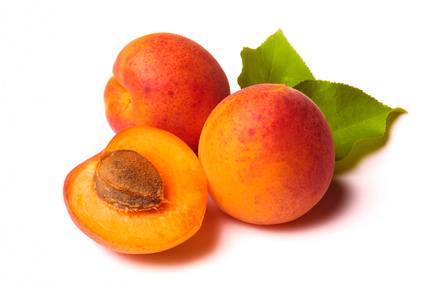Apricots
Contents
Uses
- Dried apricots lose their water, but they hang on to their nutrients. It’s one of the unique things about apricots.
- In eating 1 pound of dried apricots, you can benefit from nearly the same number of nutrients as you’d get if you ate 5 pounds of fresh apricots. This includes the valuable beta-carotene (benefit: helps eyesight among other things) and high levels of iron, potassium, Calcium and vitamin C.
- Dried apricots were used thousands of years ago by the traditional healers of the time to help iron levels in the body.
Benefits
- Apricots contain a number of potent antioxidants. We rank the apricot as a good source of both vitamin A (from beta-carotene) and vitamin C. The health benefits associated with each are multiple and well-documented.
- Apricots are rich in other antioxidants, too, including polyphenolic antioxidants like flavonoids. Diets rich in flavonoids and the other types of polyphenols found in apricots have been linked to reductions in heart disease in humans, as well as other potential health benefits.
- Antioxidants are responsible for some of the specific effects listed below, but those only scratch the surface of the potential health benefits of diets rich in these important nutrients.
- Protect Your Eyesight: Apricots are rich in the carotenoids and xanthophylls (Lutein), nutrients that researchers believe may help protect eyesight from aging-related damage To give an example of how this works, one of these nutrients (lutein) appears to be able to protect the retina—the part of the eye that picks up the visual image from the environment—from damage caused by blue light. Additionally, researchers have linked regular intake of fruit with less risk of vision loss with aging. This benefit is found in people who eat three or more servings of fruit each day. Three servings of fruit may sound like a lot to eat each day, but by simply snacking on an apricot, tossing a banana into your morning smoothie, and topping off a cup of yogurt or green salad with one-half cup of berries, you’ve reached this goal.
- Protect Against Inflammation: Apricots are a strong dietary source of catechins, a broad family of flavonoid phytonutrients (you may be familiar with these phytonutrients since they are often cited for the benefits provided by green tea). A single apricot will provide you with 4-5 grams from catechins. These phytonutrients are potent anti-inflammatory nutrients and researchers have looked extensively at their health effects. Researchers have discovered that catechins can inhibit the activity of an enzyme called cyclooxygenase-2 (COX-2), one of the critical steps in the process of inflammation. Much of this research on catechin benefits involves animal rather than human studies. But we have seen human research where diets rich in catechins—not specifically from apricots but from other catechin-rich foods like tea or cocoa—have led to significant beneficial changes. For instance, multiple studies have shown that catechin-rich foods can protect blood vessels from inflammation-related damage, leading to better blood pressure control.
- Other Health Benefits: Apricots are a good source of dietary fiber. This overall fiber content should be helpful for most people in supporting digestive health. Within the total dietary fiber provided by apricots, about half consists of soluble fiber. Soluble fiber is one type of fiber that can help to control blood cholesterol levels.
Here are a few of the important antioxidant nutrients or nutrient groups found in apricots:
- Quercetin
- Proanthocyanidins
- Catechins
- Epicatechins
- Hydroxycinnamics
- Gallic acid
- Caffeic acid
- Coumaric acid
- Ferulic acid
Cautions
Dried Apricots and Sulfites
- Commercially grown dried apricots may be treated with sulfur dioxide gas during processing. They may also be treated with sulfites to extend their shelf life.
- Sulfur-containing compounds are often added to dried foods like apricots as preservatives to help prevent oxidation and bleaching of colors. The sulfites used to help preserve dried apricots cause adverse reactions in an estimated one out of every 100 people, who turn out to be sulfite sensitive.
- Sulfite reactions can be particularly acute in people who suffer from asthma. The Federal Food and Drug Administration estimates that 5 percent of asthmatics may suffer a reaction when exposed to sulfites. Instead of the bright orange color of sulfite-treated dried apricots, unsulfured dried apricots have brown color, but are a much healthier choice for sulfite-sensitive individuals.
- Foods that are classified as “organic” do not contain sulfites since federal regulations prohibit the use of these preservatives in organically grown or produced foods. Therefore, concern about sulfite exposure is yet another reason to purchase organic foods.
References
Source: The George Mateljan Foundation, www.whfoods.com/

